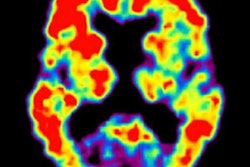Nuclear medicine and molecular imaging advocates went to Capitol Hill in Washington, DC, today to endorse a bill to improve the reimbursement process for diagnostic radiopharmaceuticals.
Representatives from the Society of Nuclear Medicine and Molecular Imaging (SNMMI), the Medical Imaging and Technology Alliance (MITA), and the Council on Radionuclides and Radiopharmaceuticals (CORAR) joined clinicians and patients to urge support for the Medicare Diagnostic Radiopharmaceutical Payment Equity Act of 2019 (HR 3772). The proposal was introduced by U.S. Reps. Scott Peters (D-CA), George Holding (R-NC), and Bobby Rush (D-IL).
"Diagnostic radiopharmaceuticals are incredibly effective in the diagnosis of a number of different diseases, among them prostate cancer, Alzheimer's, and Parkinson's disease," said Dr. Vasken Dilsizian, president of SNMMI and professor of radiology and medicine at the University of Maryland. "We've only really scratched the surface of potential with these technologies, and I expect we'll see future improvements in these diagnostic tools if policy is adjusted to better reflect patient need."
The bill would reverse current policy at the U.S. Centers for Medicare and Medicaid Services (CMS) that treats diagnostic radiopharmaceuticals as supplies and bundles the drugs with the cost of a procedure in hospital outpatient settings. The groups assert that this process promotes a reimbursement structure for radiopharmaceuticals that limits patient access to lifesaving diagnostic tools and stifles innovation.
Josh Mailman, inaugural chairperson of SNMMI's patient advocacy advisory board and a patient who has been treated for a neuroendocrine tumor, added, "Having advanced imaging available for neuroendocrine tumor patients is critical, as these advancements have helped clinicians determine the location and the extent of disease so they can better plan appropriate therapy for improved patient outcomes."



















